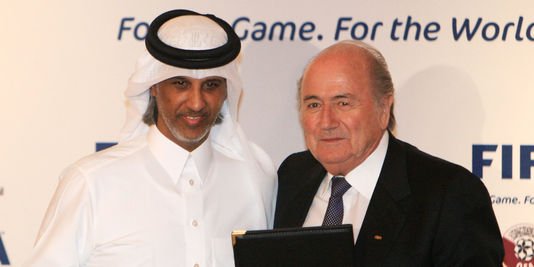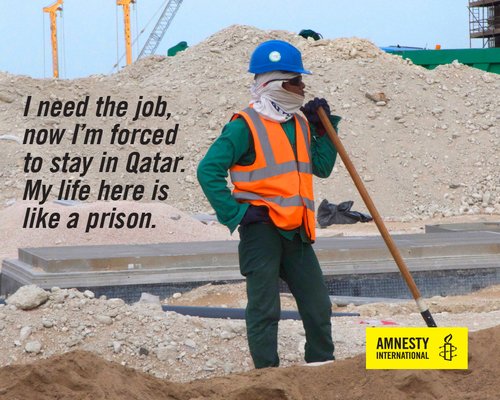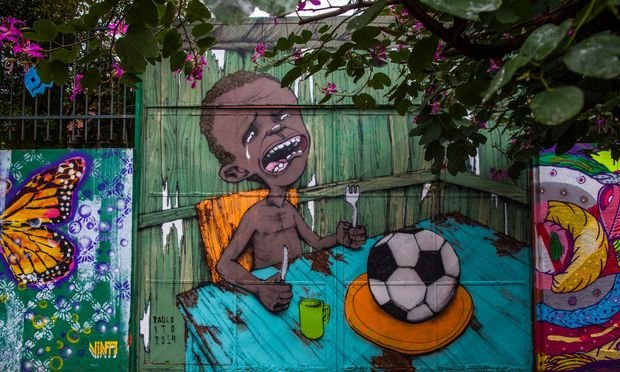The Qatar World Cup 2022: Hot, Expensive, and Corrupt
It seems pretty simple, but in reality, the World Cup is about so much more than the football. Hundreds of the highest paid athletes in the world play in front of hundreds of thousands of people. The games are a huge economical boost for any host region. When Qatar won the international bid for the 2022 World Cup, many people were left scratching their heads. How has a country with a corrupt football history, a stifling weather outlook, an immigrant workforce, and a crippled public transport system won the rights to such a prestigious event? Clearly, Qatar is not the place for the World Cup. The ballot can be reopened if evidence is brought forth of the corruption involved in the voting. Qatar should be stripped of the Cup and the other four countries (U.S., S. Korea, Japan, and Australia) should get another chance.
World Cup Prestige
Every four years, the world comes together to celebrate rich football history in the form of the FIFA World Cup. "This is the one way a country can literally be the center of the world for a month," says Laurent Dubois, a Duke University professor of Romance studies who has written a book on the politics of the World Cup. Each country that decides to field a team must first qualify by competing in their respective of the six regions. The top teams from each region move into the international grouping stage. The grouping stage is comprised of eight groups of four teams each. Each team plays each other and two teams advance out of the group based on point differential. The round of sixteen is decided in a single elimination format. From the remaining 8 teams, a bracket is created until the champion is crowned.
Qatar's budget and infrastructure
Qatar has a lot of money, mainly from oil and natural gas exports. In fact, Qatar has a 0% poverty rate and the highest per capita income in the world. All of this money means a $200 billion dollar budget for the 2022 World Cup. Imagine for a moment how beyond fathomable it is to spend two hundred billion dollars. Unfortunately, no amount of money can help the issues Qatar is already facing. The first issue is the public transportation or lack there of. Currently, there is no train in Qatar. With stadiums being a couple hundred miles away, it will be nearly impossible for fans and teams to get around. There is also very little tram or subway for intercity travel. For the subway systems that do exist, most are extremely over crowded. People traveling to the city will have to bring their own personal car or rent one. Because of the very inexpensive fuel in Qatar ($0.27/liter), car is by far the most popular form of transportation.

Qatar has promised a lot of different things with that $200B. They plan on spending $34B on a rail metro system, $7B on a port and $17B on a glitzy new airport. Included in the budget is renovation to existing hotels as well as building hotels for up to one hundred thousand people. Money cannot buy time, and time is exactly what Qatar needs to come up with a transportation solution. The original plan for a train system to be completed by 2022 is pretty far fetched. Well, the construction is already a year and a half behind with no plans of catching up. The airport has just recently opened up, and it only took an extra 6 years to complete. Qatar already has a history of sluggish construction times. Hamad International Airport will handle thirty million people a year and should have no problem handling the World Cup visitors.
We're talking about the desert
Beside transport, how about the incredibly hot temperatures in Qatar? Especially during the summer months, when highs during the day reach 120F! Not to mention that the low temperature is around 90F. In response to these allegations, Sheikh Al-Thani would like to organize the games in early June. Temperatures in June can be 10F-15F cooler, although it is still stifling. The original proposal to FIFA was very flattering. Qatar planned on building nine new stadiums and doing major renovations to the three current stadiums they have. Amid rising costs and consistent delays, the plan has already been altered and only eight stadiums will be included in the new plan. Each one is going to be in a unique location to show off the countries highlight areas. The 7 host cities include Al-Daayen, Al-Khor, Al-Rayyan, Al-Shamal, Al-Wakrah, Doha and Umm Slal. The new stadiums are going to be state of the art and completely one of a kind. There is nothing like them anywhere in the world.
During the bid, Qatar built a full-size prototype to show FIFA of the intentions on an “air conditioned World Cup”. It was assembled in Brazil and tested during the grueling heat of the 2014 World Cup in the form of “Fan Zones”. Fans in Brazil were encouraged to pass through the beta location and give their feedback. In fact, the prototype was built as an open-air area but managed to stay thirteen degrees cooler than the outside temperature. Executive Director of Communications and Marketing for the Supreme Committee for the Delivery & Legacy Nasser Al Khater said that the prototype worked perfectly. “We had a challenge, which is to try different cooling types and technologies for public places… I can say that we succeeded in this mission.” Qatar is confident that they will be able to combat the heat, but no expense will be spared in that goal.
Corruption unravels

The main issue lies in the actual securing of the 2022 World Cup. Mohamed Bin Hammam, 64, held a position within the FIFA organization since 1992. He is the former President of the Asian Football Confederation and briefly ran for FIFA’s highest-ranking chair. With unlimited funds, it is only fitting that Bin Hammam has been accused of bribery and corruption in the past. In 1998, he paid travel expenses for many FIFA officials to come to Paris. It just so happens that Paris was holding a vote and Bin Hammam was on the ballot. The vote led to his election into the presidency of the Asian Football Confederation. This is a major position to hold and there are a total of 6 confederations worldwide that make up the FIFA organization. Bin Hammam ran for the FIFA president and withdrew 3 days before the vote due to bribery allegations. He has been accused of these same crimes in the past, but Bin Hammam has never been formally charged.
Finally, the 2022 vote is commencing in 2010. Qatar shocked the world when they won the vote by a substantial margin, almost twice the amount of votes as any other country. Once again, bribery seemed to be the true victor. FIFA ethics committee announced that Bin Hammam had distributed $40,000 in unmarked envelopes to 25 FIFA voting members. FIFA’s current president, Sepp Blatter, has emails from Bin Hammam himself regarding millions of dollars and off shore bank account numbers. In December of 2012 Bin Hammam, the man who bought the World Cup resigns from all football-related duties. On top of that, he receives a lifetime ban from FIFA. Throughout all of this, FIFA has kept their mouth shut on any and all allegations. Laurent Dubois explains, "There's no justification for FIFA having so little transparency, except corruption. Really, if you think about it. Their job is to organize soccer games. Why all the secrecy?" FIFA will decline to comment on Bin Hammam and they will only acknowledge that his bribery had nothing to do with them. Qatar actually holds the same views. They want nothing to do with Mohamed Bin Hammam and reject he had any actual influence on the voting.
Extreme human rights violations
Qatar has implemented a very socialist labor system, which they call the Kafala. The Kafala does many things, but the most striking is the binding contract involved with getting a job. For the large majority of workers, life goes a little bit something like this. Immigrants are brought in from the MENA region to help build infrastructure. Remember, in Qatar only 250,000 of the 2 million people are residents. Sponsor companies will pay for travel expenses and lodging. The sponsor can then control the workers entire life because of the contract. Wage, hours, living, and leaving the country are all under contract. Now, this doesn’t seem like that big of a deal, until the sponsors are pushing the hours way to far. A large majority of workers are required to sleep at the job site. They are not provided a cot or any sort of bedding, either. An anonymous truck driver from the Philippines said, “We see that workers who complain are blacklisted, deported or threatened. Our manager told us that workers who go on strike are deported within 12 hours.”

Investigation by the media and advocacy groups such as the International Trade Union Confederation and Human Rights Watch have called the construction a “half-shaken farce”. James Dorsey, longtime observer of Mideast soccer politics and senior fellow at Nanyang Technological University in Signapore said, “Groups like Amnesty and Human Rights Watch have moral authority,” speaking of the public outcry on worker deaths, “the whole world is watching.” Workers bound by the kafala are living in modern day internment camps, laboring all day in hazardous conditions, and are often victim to wage theft and fraud.
Michelle Chen cites E:60 television show, 184 Nepali workers have died from work related injuries in the last year. 680 have died in the last five years combined and 95% of the injuries have been from “sudden Cardiac Arrest”. India has reported the same fate. 450 workers died in 2012 and 2013 combined. Under this current Kafala system, an estimated 4,000 workers will die before the World Cup even takes place. Qatar has responded by claiming they will revise the Kafala in favor of the workers. A charter was created with noble aspirations in mind, although nothing is likely to come of it. The ITUC believes that the charter is going to remain “meaningless without labor law reform”. It seems that the Qatar Chamber of Trade and Commerce doesn’t have any plans of a reform. Even if a new law was enacted, there is absolutely no guarantee that it will be honored and respected.
Learn from the past

Just to make sure this hasn’t been forgotten, Qatar plans on spending $200 billion dollars on this World Cup. Take a minute to understand how astronomical that number really is. That is four times the amount of money spent on any international games in history. The 2014 Sochi Winter Olympics was predicted to cost $18B and ended up at $51B. So who really knows what the final cost will be? It is impossible to predict how much money will be spent in the next nine years leading up to the 2022 World Cup. The World Cup in Brazil cost just under $15B. The country was in outrage considering their staggering 18% poverty during the construction of the World Cup. The people wanted to see billions being spent on their country. What hasn’t been considered, though, is that Brazil has reduced their poverty to 9% since 2005. They have successfully cut their poverty in half in nine years time. Those nine years were the entire period that they were spending this money and putting it into the economy. The money spent on construction gave so many people jobs and lifted up the economy with the flow of money. Now that the games are concluded, Brazil is left with a comprehensive public transport systems and hundreds of new jobs.
How is Qatar going to actually benefit from their gigantic investment into sports and the World Cup? “The regional situation hasn’t gone very well for Qatar in the last year, so the World Cup becomes that much more important,” says Shadi Hamid, a fellow at the Brookings Institution Saban Center for Middle East Policy in Washington. “So much is tied to the success of the World Cup, whether it’s building new hotels, or building an entire metro system from scratch, all of that is to prepare for the World Cup in eight years. So without the World Cup, what is all of this going towards?” There are thirsty countries out there that would do anything to host a World Cup. Qatar is interested in the money and the power. Brazil was interested in the economical benefits and only time will tell if Qatar will benefit at all.